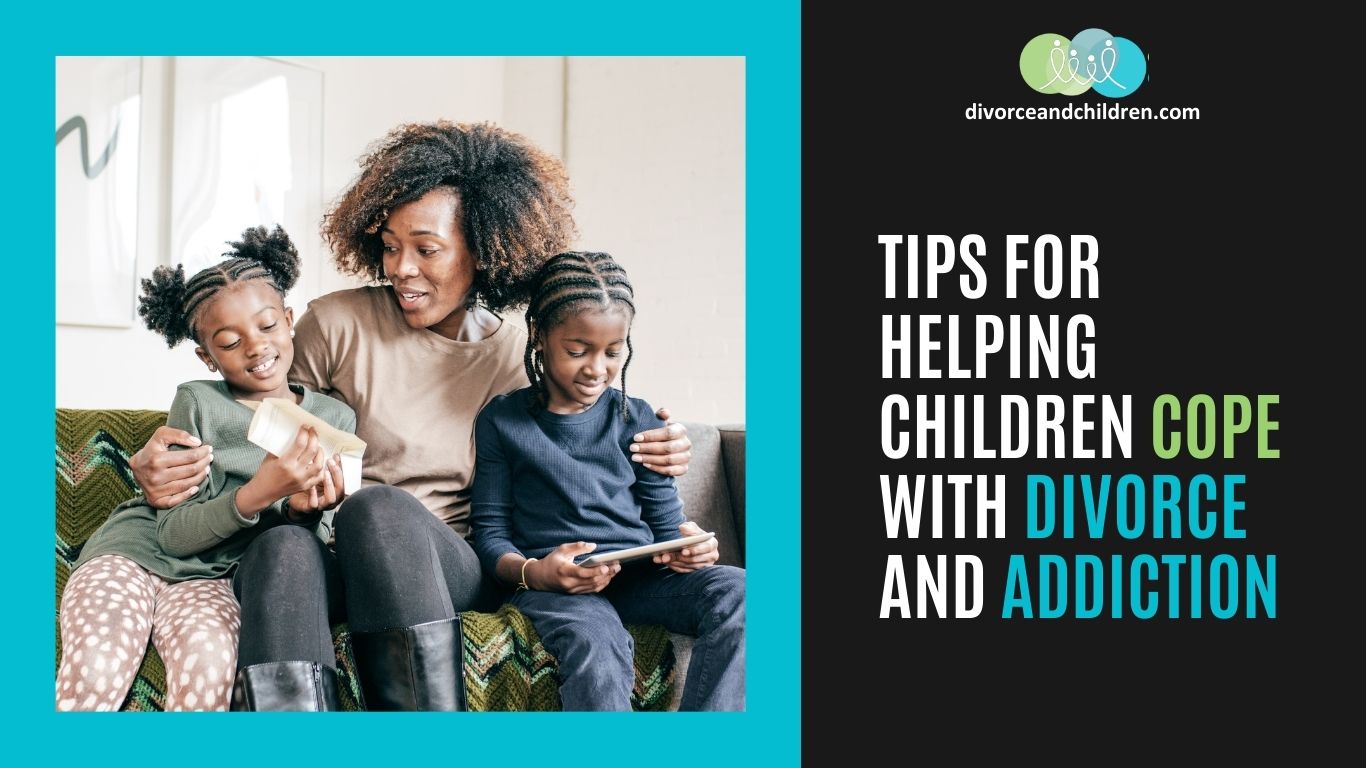Helping Children Cope With Addiction And Divorce

Following a podcast interview, a parent contacted me with questions about resources for helping children of divorce cope with a parent’s alcohol addiction.
Like many parents, this mom worries that her ex’s continual relapses are taking a toll on their kids.
She shared that the most important things to her are protecting her children from the destruction of addiction while creating stability that her children can feel good about. She also emphasized that regardless of her ex’s addiction and or recovery, she wants to be able to help her children go on with their lives while supporting them in having the best relationship possible with their Dad.
Her biggest concern is what kind of long term effects this situation will have on her children if she doesn’t get it right. Unfortunately, when it came to finding supportive resources and guidance, she came up empty-handed.
While my heart goes out to this courageous mom, I applaud her choice to take a higher road and acknowledge the value of her children having a connection to their Dad. For parents in these types of situations, it can be very tempting to bash a parent who has made bad choices or to simply sweep it all under the rug and avoid talking about altogether. Of course, neither of those options benefits kids.
In my book, Parenting Apart, I refer to these types of situations as “less than ideal.” Even though there’s not much about ending a marriage that feels ideal, when a parent is engaging in destructive behaviors like alcohol or drug abuse, it naturally creates additional challenges. Not only do children have to come to terms with the divorce, but they also must deal with a multitude of losses related to their parent’s ongoing addiction.
Because addiction frequently involves relapse, a series of broken promises and disappointments, children are often left living in a state of emotional upheaval.
When one parent is an addict, co-parenting requires a delicate balance between:
- Supporting your children’s relationship with their other parent while keeping them safe
- Providing a predictable environment while dealing with an unpredictable situation
- Acknowledging the problem without attacking the person
- Separating your feelings about the other parent’s addiction from your children’s needs
If you are a parent who is worried about the long-term impact your ex’s addiction is having on your children, there is hope. While you may not be able to control how your ex manages their addiction, you can help your children understand the situation and gain a sense of security by being a stable, nurturing force in their lives. You may also want to consider utilizing some of the recommendations listed below for divorced parents dealing with less than ideal situations.
TIPS FOR HELPING CHILDREN COPE WITH DIVORCE AND ADDICTION
Acknowledge your children’s feelings about the problem and reassure them it’s okay to talk about it.
Although it’s hard to see your children hurting, remember that supporting children’s feelings and being a good listener can go a long way with kids. When you seek to understand instead of solving your child’s problem, you are reinforcing some very important concepts. First, you’re sending a strong message that you view them as capable and competent at handling tough situations. Second, when they are facing a challenging or difficult time, talking about the problem lets them know it’s okay to seek support from others. Lastly, you are underscoring that you respect their feelings and there’s no reason to feel embarrassed or ashamed about a parent’s addiction.
Provide children with age-appropriate information about addiction.
While there’s still a big gap in support for families dealing with these issues, there are a couple of resources worth checking out. Keep in mind not every resource will be a fit for your family or your situation. Be sure to review books and resources before sharing them with your children, even when they are recommended.
Resources For Children:
- Magination Press (www.apa.org/pubs/magination) Hosted by the American Psychological Association, this site provides an online store that offers books for children addressing a wide range of specialized topics.
- Emmy’s Question by Jeannine Auth Powerful story about a school-age girl’s struggle to deal with her mother’s alcoholism. (For 9-12 years old)
- My Dad Loves Me, My Dad Has a Disease: A Child’s View: Living with Addiction by Claudia Black Provides children with an opportunity to express their feelings and fears while gaining a better understanding of addiction. (Ages 5-12)
- An Elephant In the Living Room by Jill M. Hastings and Marion H. Typpo Presented as a workbook, An Elephant in the Living Room offers children both information and tools for dealing with parental addiction. (For 9-12 years old)
For Parents:
- Understanding Addiction and Recovery Through a Child’s Eyes: Hope, Help, and Healing for Families by Jerry Moe M.A. Helpful to both professionals and family members, it offers hope and provides insight into the resilience of children whose lives have been overshadowed by a parent’s addiction.
- When Parents Have Problems: A Book for Teens and Older Children With an Abusive, Alcoholic, or Mentally Ill Parent by Susan B. Miller This book is written for teens, however, it may be a good resource for a parent to read first. After reviewing the material you may want to pick out what’s most appropriate and adapt some of the concepts it offers for your children.
Teach your children how to stay safe.
The truth is in this day and age we cannot be with our children 24/7 to protect them. Do your best to teach children how to recognize unsafe situations, when and how to call for help and to feel confident about seeking out a safe adult when necessary.
Make sure your children understand they are not responsible for their parent’s addiction.
Much like when parents divorce, children often feel a strong sense of responsibility and guilt about their parent’s addiction. Reassure your children that they are not to blame for what has happened. Also, make sure they understand they cannot change or fix their parent’s problems.
Remember healing from divorce takes time. When other issues like alcohol or drug abuse are thrown into the mix that process often takes much longer. More than anything, find a way to keep moving forward so children don’t get stuck in the anger and sadness. Also, during this time be sure that you are paying close attention to your own needs. Develop sources of support for you and your kids outside of your immediate family.
Additionally, organizations such as ALNON, ALATEEN and ALATOT can be options for information. In many areas groups are available and provide an avenue for connecting with other families who are familiar with the dynamics of addiction.
If you are a parent who has tips or information to share about co-parenting with an addict or a parent in recovery, please leave a comment. I’d love to hear what helped you and your children.
Looking for more support? This might help.
x,





